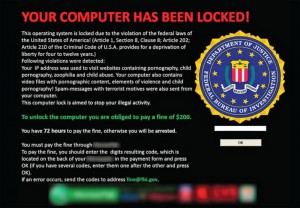CryptoLocker Alert: A Virus You Need to Understand

Are you prepared for CryptoLocker, the next wave of Internet virus?
CryptoLocker is the next generation of internet virus that is currently circulating all over the world in large numbers. Once a computer becomes infected it will lock all your files plus any network files it has access to, even your server. Once the files are locked it will give you a three day countdown to pay the ransom, usually $100 or $300. If the time expires your files are locked with no option to pay the ransom.
Currently there are only two known methods to remove the infection, restoring your files from a backup or paying the ransom. Please be aware that paying the ransom is not guaranteed to work. We don’t condone paying the ransom as it supports and encourages these cyber criminals.
What makes CryptoLocker exceptionally dangerous is the fact in most cases it can pass right through all Anti-virus protection suites (my go-to IT security firm for matters like this, Sierra Ridge Networks, is working with their anti virus partners to make sure they provide the most current solutions – make sure your tech guys are doing the same.)
How CryptoLocker Generally Invades Your Systems
- In the form of attachment, usually disguised in an email appearing to come from your bank, insurance company or courier service or scanner.
- Through Trojan websites, which will ask you to download a piece of software in order to watch video clips or download songs off the internet.
- Through malicious websites with names similar to popular ones, waiting for you to mis-type the URL and share as if on your favorite website.
Advice for Preventing the CryptoLocker Virus
- Never open attachments if you are unsure of the contents, the sender or if your gut says something isn’t right.
- Look for clues in the email content. Most legitimate emails will address you by name and not something generic like ‘customer’ with vague wording.
- Misspellings, faulty English, promises of riches, freebies or other bribes are all signs that something is fishy.
- Do not click on website links in emails until you have viewed the link location. Do this by hovering over the link, which will display the actual link at the bottom of your email program – if the link and the hyperlinked text don’t match, you’ve got a problem). Instead of clicking the link, you are best to manually type the URL into your browser.
- Make sure your anti-virus is updated regularly on EVERY system connected to your network, including mobile devices.
- Make sure your backups are current and working and backing up ALL critical data.
If You Get Infected by CryptoLocker
- Stop work! TURN OFF YOUR COMPUTER! Shut down your entire network, if possible until help arrives.
- Contact an IT Security specialist. I use Sierra Ridge Networks out of Colorado.
- Alert people on your network, as any work completed after infection will be overwritten when the backup is restored.
John Sileo is NOT an IT Security Specialist, but an author and highly engaging speaker on internet privacy, identity theft and technology security. He is CEO of The Sileo Group, which helps organizations to protect the privacy that drives their profitability. His recent engagements include presentations at The Pentagon, Visa, Homeland Security and Northrop Grumman as well as media appearances on 60 Minutes, Anderson Cooper and Fox Business. Contact him directly on 800.258.8076.
Sorry, comments for this entry are closed at this time.









1 Responses to CryptoLocker Alert: A Virus You Need to Understand
Great post and very informative. Great preventative advice too. Thanks